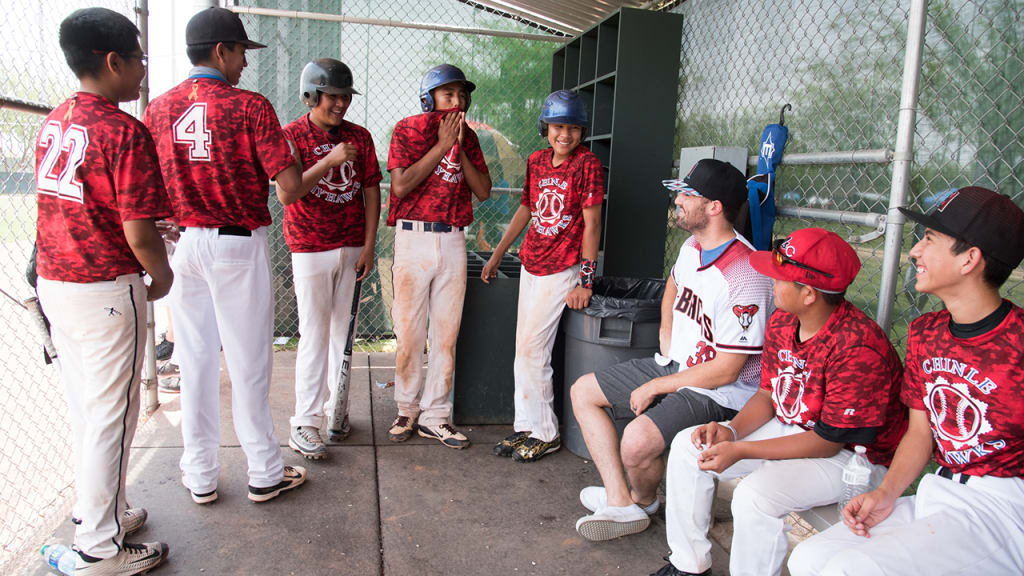
SCOTTSDALE -- A lot more mattered than the scores, the championships and the trophies this week as about 1,200 Native American youths played on pristine fields in the 18th annual Arizona D-backs Inter-Tribal Youth Baseball and Softball Tournament.
Although the games are competitive at Salt River Fields, the D-backs' Spring Training home, the goals are much more meaningful and lofty than merely winning a baseball game or a tournament bracket.
The unique event is the only Native American baseball tournament sponsored by a Major League team, according to D-backs officials. The tournament was launched in 1998, the same year the D-backs' started playing as a National League expansion team, said Tara Trzinski, senior manager of community and foundation operations, who also serves as tournament director. It began with 24 teams and has grown to 74 teams from five states representing 38 tribes.
The tournament precedes the annual Native American Recognition Day on Saturday, when the D-backs will honor Native traditions and give away 20,000 special tribal caps before their game at Chase Field against the Miami Marlins. All players participating in the youth tournament receive free tickets.
Salt River Fields sits on the Salt River Pima-Maricopa Indian Community. Arizona is home to several other Native communities, including the Navajo, Hopi, Pascua Yaqui, Apache and Tohono O'odham tribes.
"It's not just being a baseball player. It's part of our community. It's right in our backyard,'' said D-backs pitcher Robbie Ray, who is proud of his Cherokee heritage. "You can see it in these kids here. They have a passion for the game.''
Ray, who attended the event Friday morning, said he is humbled by the thought that Native children would be inspired by him. One boy told Ray that he had watched all of his starts on TV.
Ray said he realizes his job involves much more than pursuing a lucrative career.
"Any way to lift these kids up, any way to lift up their spirits, not only on the field but off the field,'' he said after talking to players in four different dugouts, posing for pictures and signing autographs.
Chanda Whitehorse of Page, Ariz., said her town does not have enough Native players to field a team of its own in a Native tournament and it was an honor for her two sons, Colin and Mychal, to be invited to participate.
"It's respecting family and friends, respecting the game and looking forward in life,'' said Erwin Whitehorse, her husband.
Motivation, inspiration, learning teamwork and respect, and using baseball as a springboard to a college education are all mentioned repeatedly by parents, team officials, and Ray, as the tournament's hallmarks.
"I think it's a great way for them (the D-backs) to give back to the community,'' said Emmett Begay, manager of the Chinle White Sox, who are from the Navajo Nation in the Four Corners region of northeastern Arizona. "The fields are great compared to our dirt. This is about baseball heaven for us.''
Begay said college recruiters and professional scouts don't often travel to an isolated place like Chinle, so the tournament gives players exposure that might help them get a college education or pursue a career in baseball.
Chan Salway of Chinle said her son, Jakub Joe, a catcher, received several scholarship offers but was unable to accept them because he graduated from high school a year earlier. She said he will attend Central Arizona College later this year.
"It gives him the determination and the will to achieve his dream,'' Salway said.
She said the tournament represents the first opportunity for some players to leave a Native reservation and broadens their views and their goals.
"This is probably the furthest they have gone," she said. "It gives them a lot of experience. It teaches them to shoot for higher and better.''
Junior Natahlie of Kirtland, N.M, was one of many Native Americans who praised the organization for sponsoring the tournament. He said that other boys on the reservation look up to players who have played in the tournament and want to emulate them.
"The main thing is they learn how to conduct themselves, that they learn to stay away from drugs and having a bad attitude,'' Natahlie said. "I was never into baseball until my son got here. It's really good for the kids.''
Brothers Trevor Smith, 15, and Brandon Smith, 13, cited the outstanding fields, leaving the reservation, and playing at a higher level of competition as the reasons they enjoy the tournament.
"I think they are doing the right thing,'' Trevor Smith said, adding that he is grateful for the tournament. "It's fun to come out and play yourself and watch other people play.''